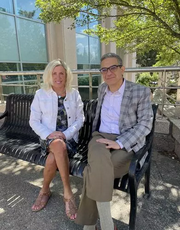Author: Karen Cook, Faculty of Nursing

Nancy Moules, left, and Ted George.
What happens when a nurse researcher and a philosopher are in the same room together? When they both work in the area of hermeneutics, it is a bit like a fast and furious but friendly game of philosophical ping pong constant ideas and questions bounce back and forth with, well, plenty of interpretation.
That was the case recently when Dr. Theodore "Ted" George, one of UCalgary Nursing's newest adjunct professors, visited Calgary to meet up with Dr. Nancy Moules, RN, PhD, professor and associate dean, research in the nursing faculty, to discuss their current projects and the future.
"I have known Nancy for seven years, when she and some colleagues attended the North American Society for Philosophical Hermeneutics in 2015. Nancy then invited me to attend the Canadian Hermeneutic Institute (CHI) as the visiting speaker in 2018," George says of the yearly conference Moules co-founded and organizes. It brings together not only philosophers and nurses, but also members in other practice disciplines such as education, counselling psychology and social work.
"Then I invited her and some of her colleagues to Texas to participate in a philosophy conference and of course, everyone was very impressed. When a philosopher says she knows what she's doing,' it is the highest compliment: it means she can think philosophically."
A noted philosopher, hermeneutic researcher and head of the Department of Philosophy at Texas A&M University, George says the CHI and collaborations with Moules have been a significant influence on his research and has allowed him to develop friendships and collaborate with colleagues across a number of disciplines.
"I came to Nancy's work because I wanted to learn more about philosophy, in addition to learning about health care," he adds. "What intrigues philosophers about her work is that she exemplifies how hermeneutics can be and, really, is always about something other than philosophy."
Hermeneutics defined
Moules has almost singlehandedly established UCalgary Nursing as a hub for hermeneutic scholarly work. Hermeneutics is the study of interpretation and is particularly fitting to health care as there is much to be studied and learned outside of medical and/or social science research.
George's particular explanation is that it is a "study of interpretation and a research approach that can be very successful when other methods of research don't get you to an answer. The scope of hermeneutics is universal."
For example, George and Moules are working together on a research project around the nature of grieving in the context of social media: understanding why people choose to go public with their cancer diagnoses or, in the case of their study, with the grief they experience after the death of a child on a platform like Facebook.
"Hermeneutics is at its best when it disappears," explains Moules.
The philosophy goes quiet and theoretical suppositions fade away. We are examining this topic not by looking at the experience for the sake of the experience, but to interpret it.
George adds, "From a philosophical perspective, there is a poverty of understanding, but there is an excess of meaning in what we are studying. There is data saturation when it comes to most research, but when looking at something from a hermeneutics lens, you really can't over-exhaust a topic."
Adjunct professors in the faculty typically are in some area of health care and contribute through representation on committees, guest lectures and presentations. George is unique in that he is the first philosopher and is grateful for the distinction of both.
"It really allows for more research with nurses and with students as well. The intellectual quality of the nursing students here is of a very high standard. I am looking forward to participating in many different areas. I am so delighted that the relationship with the faculty has been formalized in this way: it is just an incredible honour for me."










